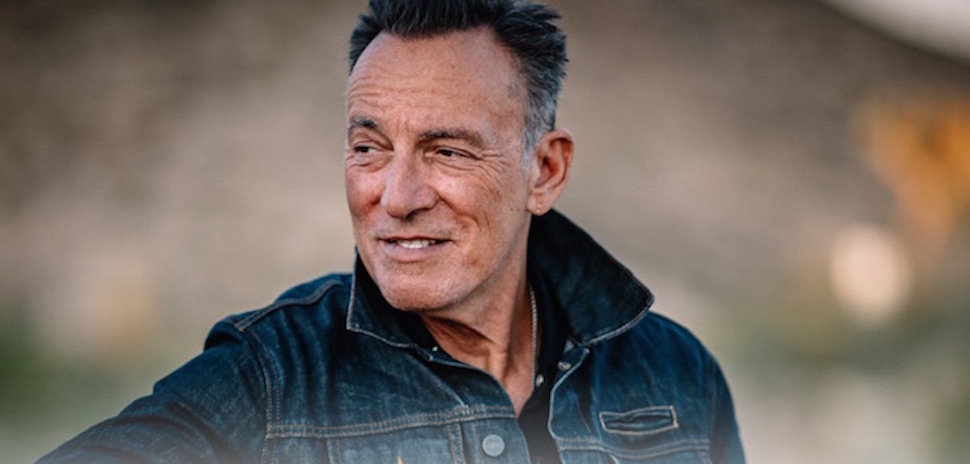When Bruce Springsteen talks these days, it’s in sharp contrast to the things he used to talk about: namely cars, heading out on that highway, not looking back, and the spirit of adventure as we look deep out there into the unknown. Today, Springsteen often talks about “the train.” That train that’s barreling down on all of us, that particular one we just can’t avoid. Springsteen often talks about this train and how, for some of us, it’s pretty far off. And, for others, well it’s a lot closer. Springsteen says he’s at an age now where that train doesn’t seem too far away anymore. And that has to be a big reason why Bruce – just a couple of weeks now from his 70th birthday – has opened up so much recently. The cracks in his carefully crafted persona are his own doing. Between his book, his Broadway show, and now his directorial debut, Western Stars (co-directed by Thom Zimny), Bruce is deconstructing “The Boss” right in front of our eyes. Before he’s done, Springsteen wants us to know that he’s very much human.
Springsteen didn’t tour to promote his album Western Stars (released back in June), instead opting to make a movie that’s part concert film and part meditation set to landscapes from the American Southwest. The theme of the album (the “character” Springsteen created) is about an aging star of old Western movies who, as Springsteen puts it, still visits his old watering holes, but is now the oldest patron in the bar.
Obviously there are more than a few similarities between this character and Springsteen – now a rock legend, as relevant as ever, in a world where rock itself is dying and all but a few of his contemporaries still share this kind of success. Yes, I bet Bruce is often the oldest person at the bar. For the film, Springsteen filmed his performance of Western Stars in its entirety (with one bonus song, we’ll get to that later) over the course of two days – in a renovated 19th century barn, with select friends and family in attendance, becoming the most intimate setting possible for a Bruce Springsteen concert. The performances are a delight, as Springsteen – along with his wife and E-Street Band member, Patti Scialfa, and a whole host of musicians, including a full string orchestra – gives us an intense lyrical veracity that brings all the songs on Western Stars to life (admittedly, an album I like very much, but am still in the process of warming up to). Often, while Springsteen is performing, we get so close to Springsteen’s anguished face that I swear we can see right into his soul.
But the aspect that transforms Western Stars from a concert film into something special – something that fits with Springsteen’s recent self confessionals – are the monologues (again, more meditations than stories) in between the music. For a man whose team has shielded him from overtly bad press over the years – obviously there’s always some, and it’s not like Springsteen has any kind of reputation as a hellion, but his “brand,” if you will, has been highly guarded – he’s being awfully honest as of late. (He’s gone on record saying that he’d like to be even more honest, but his rule is if something he says could hurt someone else, he won’t do it.) At one point, between songs, Bruce opines about how he’d always try and hurt the people who loved him the most. This is a striking confession. It’s a portrait of one of the most famous people on Earth laying it all out there, set to the serene beauty of American Southwest landscapes. But never too long before we get back to the music.
As Western Stars moves on, it becomes less about a lonely, regretful drifter (who also happens to be Bruce Springsteen), and more about a human being who found redemption through his wife and family. Patti Scialfa and their children become more and more of a focal point in Bruce’s words, music, and eventual redemption. The end credits show Bruce and Patti; the show is over, but they’re still there, sitting at the bar in that old barn, sharing some laughs.
Of course, Bruce Springsteen isn’t going to leave the stage without an encore. And what a curveball we get: Springsteen’s rollicking, show-stopping cover of Glen Campbell’s “Rhinestone Cowboy.” (Technically Campbell’s version is also a cover, but whatever.) Bruce pulsates his way through the song, every word commanding interpretation after what we all just watched: a song about perseverance and redemption, ending in this last triumph.
Bruce Springsteen is in an interesting phase of his career … perhaps his most interesting. Next year he’ll return to his duties with the E-Street Band in support of another new album, but this era will be remembered as the moment he let his guard down and opened himself up to the world, apart from his music. (He’s always been “open,” musically. But now he’s just literally telling us.) And Western Stars is a reflection of that.
Don’t go into Western Stars expecting to see The Boss. That guy is on a break. What we get instead is Bruce Springsteen, a human being who seems a lot less sure of himself than The Boss ever did. Springsteen’s book gave us some details, but Western Stars looks straight into his soul.
You can contact Mike Ryan directly on Twitter.







